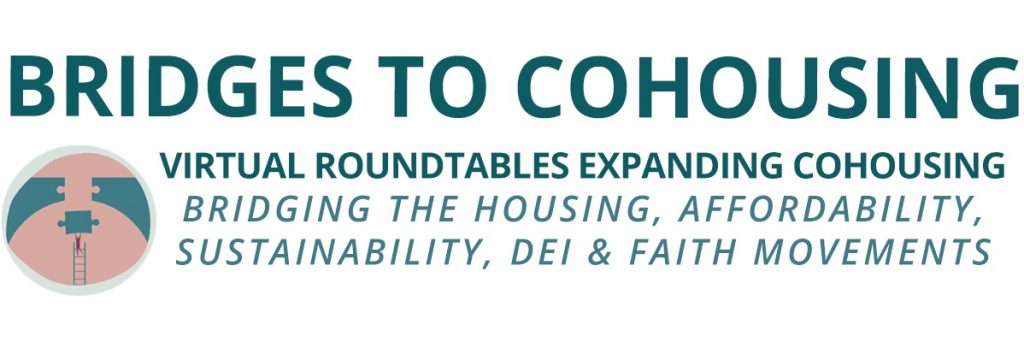
In leading up to the National Cohousing Conference in August, we are hosting a series of virtual round table discussions featuring leaders from cohousing and related movements.
The format of these events is two parts. Part one is an introduction to the topic featuring case studies and emerging trends from movement leaders. Part two is a round table discussion allowing stakeholders and leaders to offer input and questions exploring what’s possible related to each weekly topic.
BRIDGES TO COHOUSING: HOUSING THAT’S FAIR – JULY 12
Exploring Cohousing Affordability featuring Katie McCamant, Eve Stewart + more
Register for the recording for 7/12 here
BRIDGES TO COHOUSING: HOUSING THAT’S GREEN – JULY 26
Exploring Sustainability and development featuring Erik Bonnett, Sky Blue + more
Register for the recording for 7/26 here
BRIDGES TO COHOUSING: HOUSING THAT CARES – AUGUST 9
Exploring DEI in Cohousing featuring Crystal Byrd Farmer, Pedro Silva + more speakers TBA
Register for the recording for 8/9 here
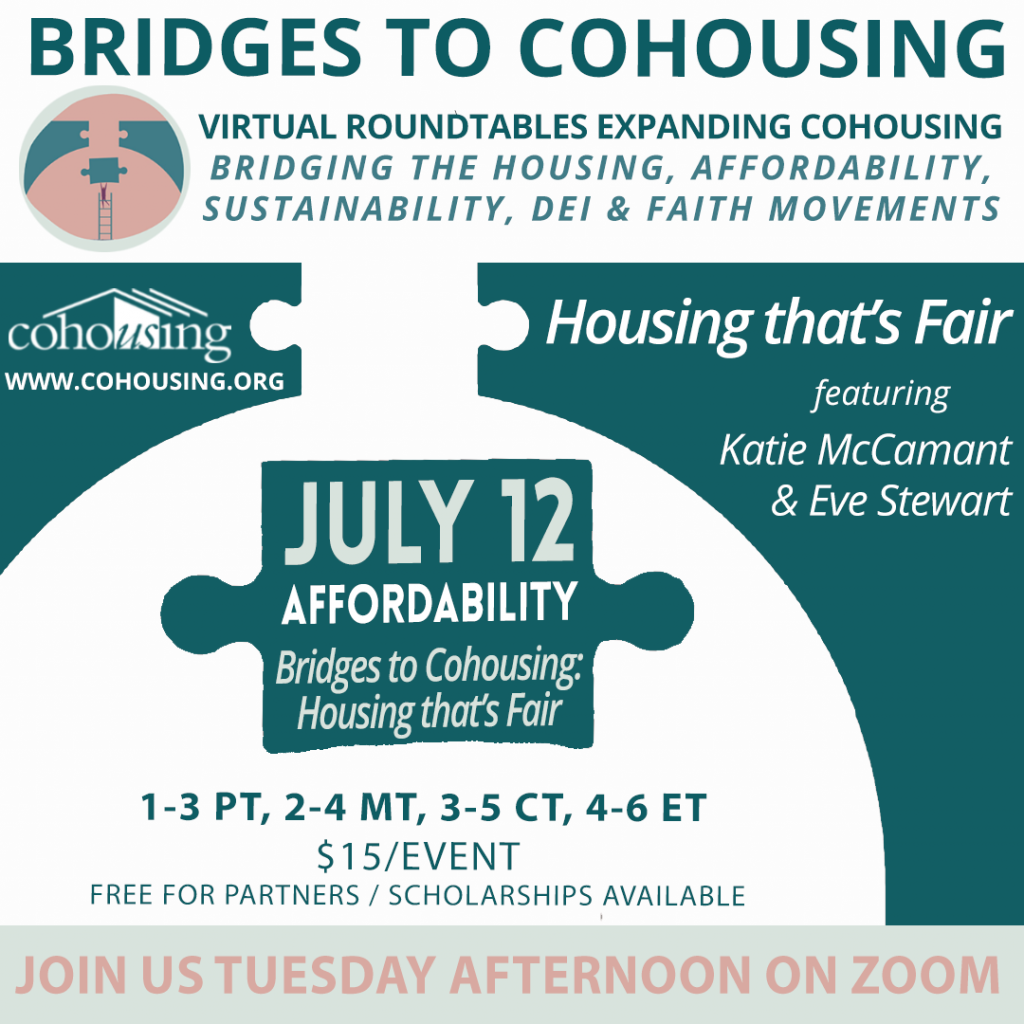
Part 1: Learn the basics of cohousing affordability including types of subsidies and how they work related to costs. Discover best practices in cohousing affordability such as inclusionary units, voluntary community contributions, and informal solutions. Hear about the development and impacts of affordable cohousing developments such as Petaluma Avenue Homes developed by SAHA (Satellite Affordable Housing Associates) and Cohousing Solutions.
Part 2: Ask questions and offer input on expanding cohousing affordability.
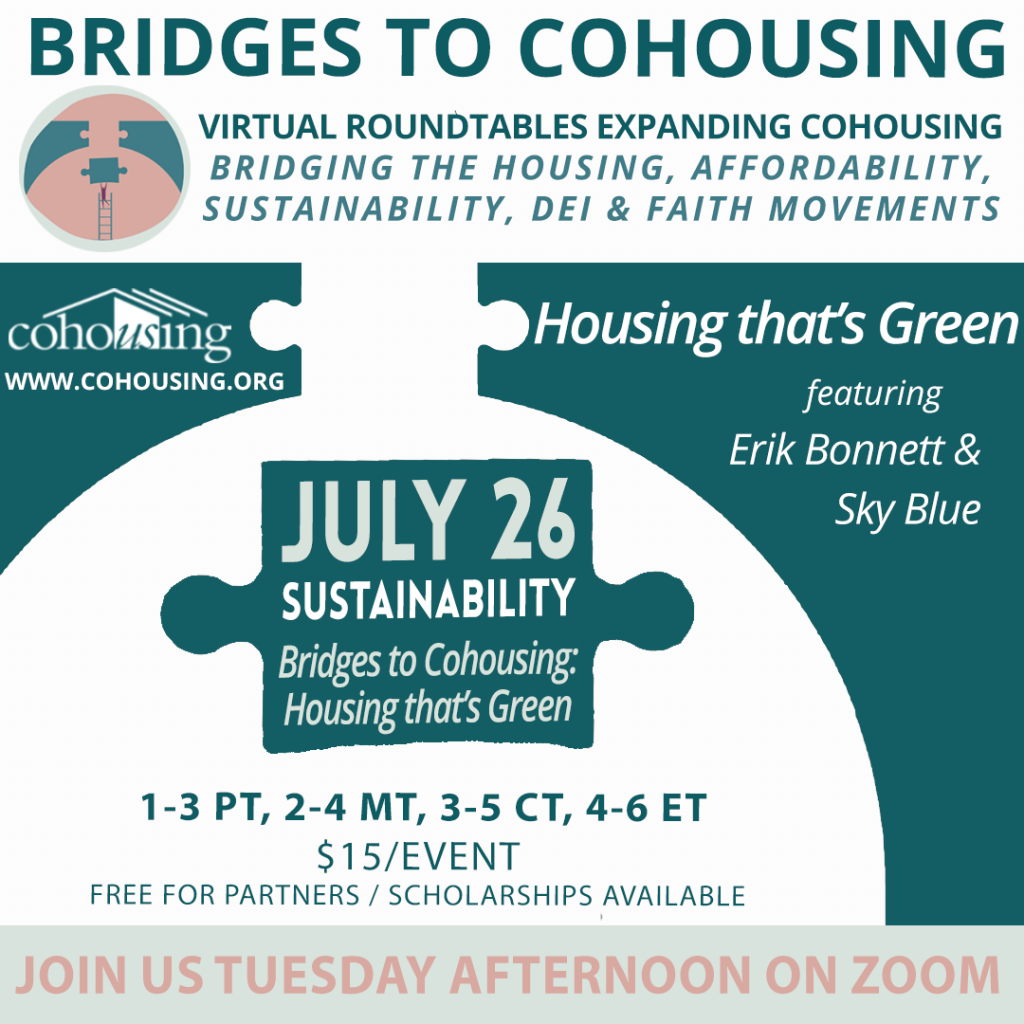
Part 1:
Human climate impact is a major concern affecting the way we live and need to live in the future as the earth continues to be harmed by human economic, lifestyle, and political choices.
Cohousing shows we can live a life using less and sharing more through community. Learn from sustainability experts on how cohousing can lower the ecological footprint of housing from materials and design during development to energy use and other practices once inhabited.
Sky Blue will focus on how sharing in community can have both ecological, social and economic benefits. This will lead us into an exploration of what’s possible for how cohousing communities can share more to be more green, as well as affordable, and socially satisfying.
More details coming soon!
Part 2: Ask questions and offer input on expanding cohousing sustainability.
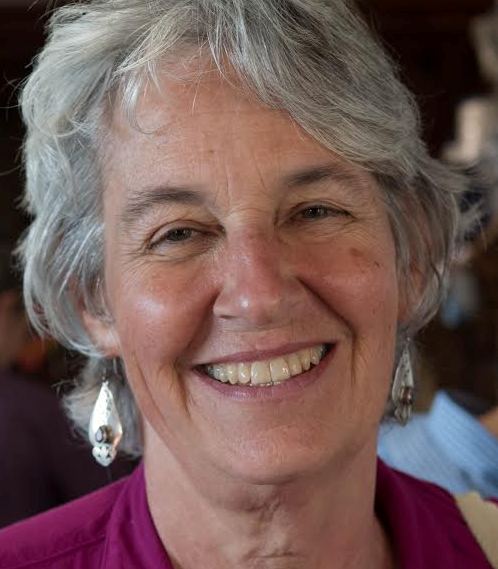
Liz Walker co-founded EcoVillage Ithaca (EVI) thirty years ago, and dedicated her full-time
work for the next three decades to bring this internationally acclaimed project from vision to
reality.
She’s written two popular books: EcoVillage at Ithaca: Pioneering a Sustainable Culture,
(2005, New Society Publishers) and Choosing a Sustainable Future: Ideas and
Inspiration from Ithaca, New York, (October, 2010, New Society) which have been
translated into several languages.
Last summer Liz was interviewed about EVI for a YouTube video, which now has 1.2 million
views. People are hungry for community!
Liz lives with her husband at EcoVillage Ithaca. Whenever she gets a chance, she loves to
go biking, or hiking in the beautiful gorges in the Finger Lakes region of NY
https://ecovillageithaca.org/
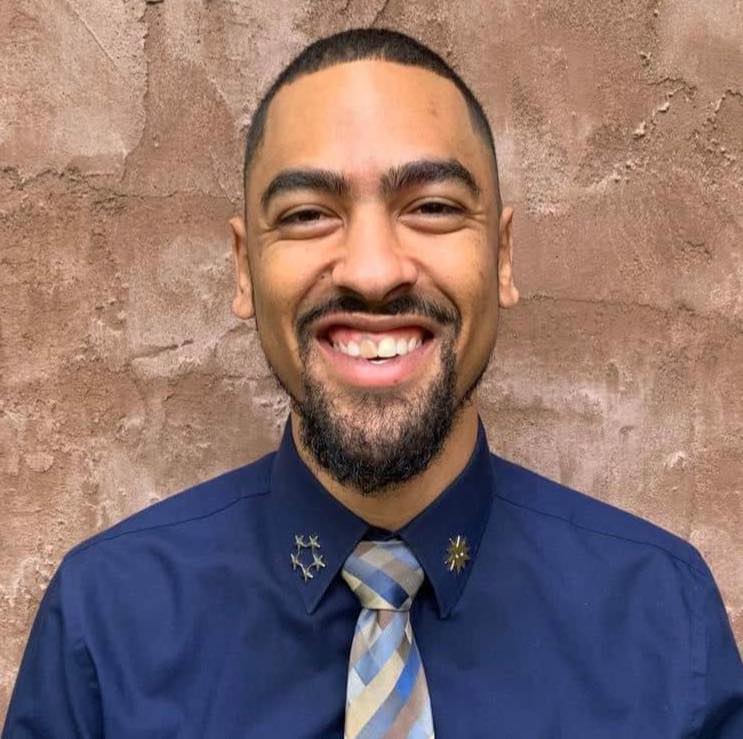
Mike Wird is an advanced permaculture designer/consultant/teacher, artist educator, and natural builder, who shares his dedication to social and environmental justice through cultural arts and regenerative practices. Mikehas been actively building community for over a decade as a cultural arts ambassador, raising awareness about social, environmental and ecological issues and their solutions in our environments.
In 2011, Mike received his diploma in Earthship Biotecture, and was certified in Permaculture Design, studying under Adam Brock, Toby Hemenway, Larry Santoyo, Penny Livingston, Michael Becker, Jason Gerhardt, Jerome Osentowski, and others. In 2013, he received his advanced permaculture design certificate and permaculture teacher training with Sandy Cruz, Becky Elder, Peter Bane, Pandora Thomas, Eric Toensmier, and Brad Lancaster.
In 2012, Mike graduated from the Greater Good Academy, a triple bottom line business school focusing on socially and ecologically responsible business practices. In 2013, he received his advanced permaculture design certificate and permaculture teacher training with Sandy Cruz, Becky Elder, Peter Bane, Pandora Thomas, Eric Toensmier, and Brad Lancaster.
In 2014, the City of Denver along with Green For All, a non-profit organization based out of Oakland, California, dedicated to creating a green economy strong enough to lift people out of poverty, awarded Mike for his work within the Hip hop arts and Permaculture communities. In 2017, Mike co-founded the Boulder Permaculture Design Course and facilitated a permaculture design certification course for the people on the island of Dominica. In 2019, he consulted, brought together a building team and had permitted and built one of Pueblo, CO’s first residential biotecture homes.
Mike is Co-Founder of Regenerative Adventures LLC, an education firm offering services and opportunities in alignment with integrated living systems. The Center for Regenerative Living is a project of Regenerative Adventures, which aims to bring regenerative lifestyle practices to the urban core.
regenerativeadventures.com
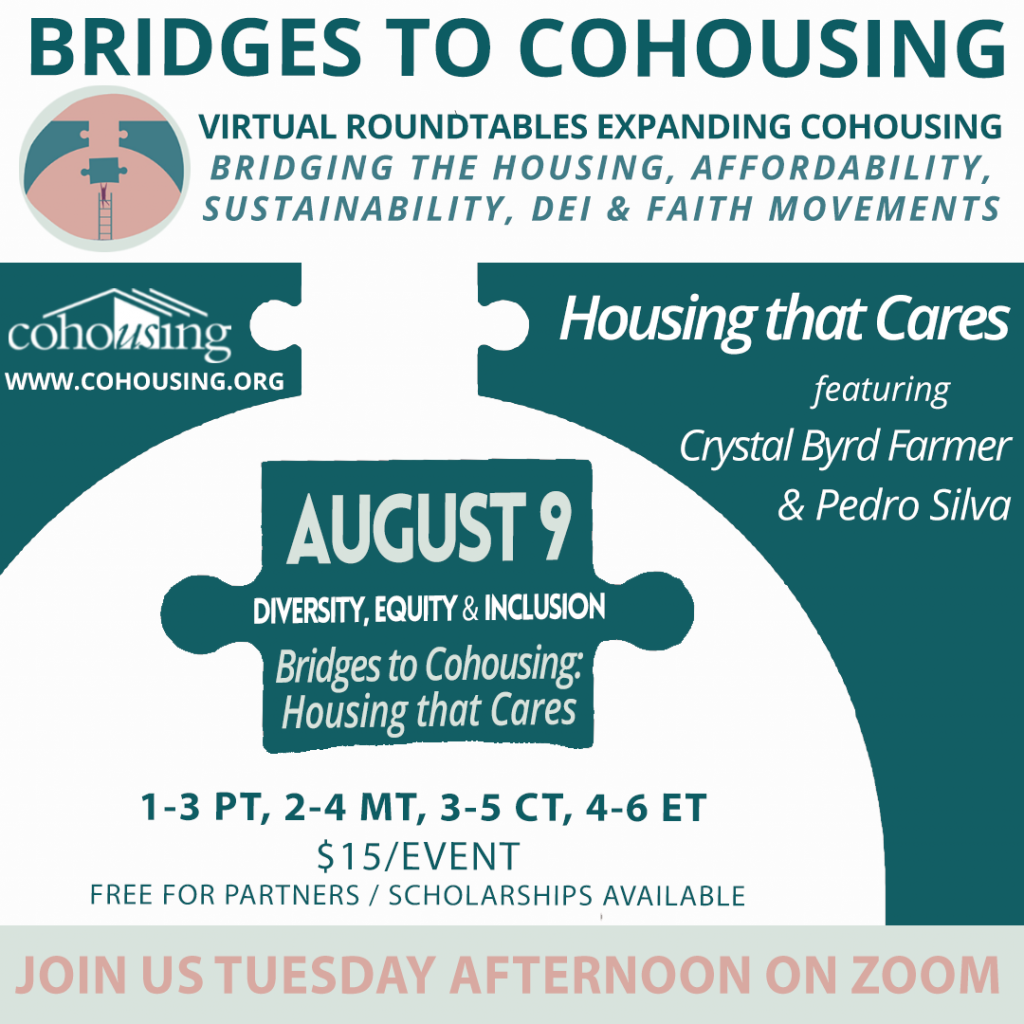
Part 1: Cohousing supports a culture of caring and sharing. Join diversity, equity and inclusion experts to hear about trends in supporting greater social inclusion in cohousing.
“Where do I belong?” is one of the fundamental human concerns. Belonging is an essential need for every person. And, creating greater belonging is the main ingredient for community thriving and healthy democracy. Unfortunately, we don’t often consider how space can foster or deter belonging. The fact is that when where meets why, powerful things happen. That’s why when trying to create spaces for optimal relating it is important to remember that places are are also tools of communication. The way space is set up tells us a number of things such as:
Pedro Silva will talk about how communities can set themselves up as invitational spaces for diverse peoples and how cohousing communities can leverage the autonomy of their spaces in the service of the wider communities of which they are a part.
Crystal Byrd Farmer will be talking about ways cohousing communities are trying to recognize and acknowledge identity-related harm in their communities as a step toward being more inclusive. We will review conflict resolution processes that communities often use and thoughts on how to incorporate an understanding of marginalization and power and privilege.
Chuck Durrett will be sharing about his work applying a cohousing-inspired approach as a solution to homelessness as discussed in his book How to Address Homelessness in Your Town. He will be sharing about the advocacy work he has spearheaded, and case studies such as a 70-unit development project he is part of in American Canyon.
Part 2: Ask questions and offer input on expanding Diversity Equity and Inclusion in cohousing.
CohoUS represents the national cohousing movement in the US supporting the growth of the movement through education, networking, and advocacy. Our work is motivated by shared commitment to impacts that have been identified by stakeholders through interviews and other engagements over the years with some of these key impact areas being:
These events will be available as both LIVE DISCUSSIONS on zoom, as well as RECORDINGS that will be made available the week following the live event.
We encourage you to join us in any of the following ways that work for you, as: